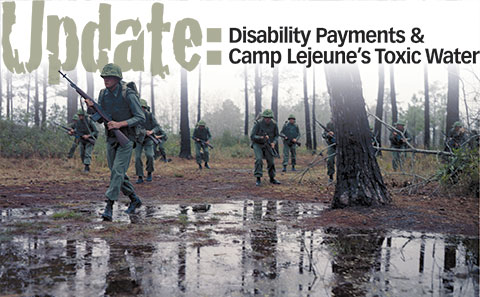 |
||||||||||||
|
May/June 2017
BY RICHARD CURREY On March 22, the Marine Corps and the Department of Veterans Affairs announced a new rule that provides VA disability benefits for veterans who have one of eight diseases and who served for thirty or more consecutive days at Camp Lejeune, N.C., between August 1, 1953, and December 31, 1987. The ruling is both very good news and a landmark achievement for the veterans, activists, victims, and family members who have waged a thirty-year battle for medical care and disability benefits related to exposure to contaminated water at the Camp Lejeune Marine base. The VA estimates it will disburse $2.2 billion over the next five years to qualifying Lejeune veterans with disability status awarded for one of the following diseases: kidney, liver, or bladder cancer, non-Hodgkin’s lymphoma, adult leukemia, multiple myeloma, Parkinson’s disease, aplastic anemia, and other disorders in which the bone marrow can no longer produce enough healthy blood cells. Camp Lejeune’s tainted water is one of the most notorious environmental catastrophes in a national history peppered with such cases. It is the toxic water case against which all others are measured. “Contamination and Betrayal: The Continuing Saga of Camp Lejeune’s Toxic Water,” in our May/June 2016 issue, revisited and updated a feature article published in these pages in 2004, one of the earliest reports to appear anywhere on what was then just emerging as a major health threat for Camp Lejeune veterans. As we reported in both articles, Camp Lejeune’s water supply was contaminated with high levels of volatile organic compounds (VOCs) from the late 1950s (although probably earlier) through the mid-1980s. VOCs are the solvents, lubricants, pesticides, and other chemicals that abound on all military bases. When humans are exposed to these chemicals—be it through skin contact, inhalation, or ingestion—the results can be horrific. In addition to the eight illnesses now approved for presumptive disability status, birth defects, stillbirths, early infant deaths, and nervous system diseases are all potential outcomes of VOC exposure. But Camp Lejeune’s water is more than a medical nightmare. It is also a tale of abdicated responsibilities at the highest levels of the Marine Corps. Despite many reports filed with the base administration that reported the rising alarm of water engineers and environmental consultants through the 1970s and early 1980s, no official action was taken to curb the contamination until public awareness shited from knowledge to outrage. Scientific data now estimates that more than one million people were exposed in the decades that Lejeune’s water contamination went unchecked. Long a vanguard in the fight on behalf of Lejeune veterans and their families, retired Marine Master Sgt. Jerry Ensminger has, along with other key activists and advocates, labored for years to locate, organize, distill, and publicize the evidence needed to move the VA to action. Largely thanks to the efforts of Ensminger and his associates, the federal Agency for Toxic Substances and Disease Registry now officially acknowledges that “past exposures to contaminants in the drinking water at Camp Lejeune likely increased the risk of cancers and other adverse health effects of residents (including infants and children), civilian workers, Marines and Naval personnel.” The Honoring America’s Veterans and Caring For Camp Lejeune Families Act, signed into law by President Obama in 2012, authorized medical care (but not disability benefits) for fifteen illnesses related to living at Camp Lejeune between 1957 and 1987. Lejeune activists then prepared for the next challenge: establishing presumptive disability status for those harmed by Camp Lejeune’s water. Nearly eight thousand Lejeune veterans receive VA medical care for water-connected ailments—but very few have been granted a disability rating. With help from Sens. Richard Burr (R-N.C.), Thom Tillis (R-N.C.), and Johnny Isakson (R-Ga.), then VA Secretary Bob McDonald agreed to institute presumptive disability status for Lejeune’s veterans, families, and civilian employees. But presumptive status was limited to just three conditions—not the fifteen that qualified for full VA medical care. After an outcry from Ensminger and other advocates, along with their supporters on Capitol Hill, the VA decided to approve eight diseases for presumptive disability status. It’s a step in the right direction, but the disability benefits task remains unfinished. “This has been a hard, long slog,” Ensminger told PBS News Hour last January. And, he added, “this is not the end of the issue.” Many advocates and benefits specialists agree that much work remains to be done to bring the Camp Lejeune benefits programs into line with prevailing scientific data. Some contend that the VA’s application of scientific evidence is arbitrary and, at times, nonsensical. One example: The VA’s medical care and disability qualification requirement of at least thirty consecutive days served at Camp Lejeune has no solid basis in science. Another example: The VA’s list of diseases qualifying for medical care only—versus medical care and disability benefits—begs questions of consistency, fairness, and the equitable application of scientific evidence. Fifteen illnesses presumptively qualify for full VA medical care, but only eight also qualify for disability benefits. The VA tells us those eight conditions “are the only ones for which there is sufficient scientific and medical evidence to support the creation of presumptions.” But if fifteen Lejeune-related diseases presumptively qualify for the VA’s full range of medical care, why do only eight presumptively qualify for disability benefits? The VA says it will “continue to review relevant information as it becomes available,” so we can hope that process takes something less than another decade. At this point, there is no clear avenue or administrative process for Lejeune veterans who filed disability claims before the recent ruling. Nor are there provisions for assistance to the children (now adults) who lived at Camp Lejeune, often for many years, and whose health was harmed by the tainted water. Any Camp Lejeune veteran who meets the VA’s service and medical condition criteria can enroll in VA health care by calling 877-222-8387 or going online. There is also further information here. For those who also seek disability status, the VA’s e-benefits website is the disability claims portal. VVA provides claims assistance and one-on-one help from veterans service officers throughout the nation. More information is available online at or by calling VVA Veterans Benefits at 301-585-4000. |
||||||||||||
|
|
||||||||||||
|
||||||||||||
8719 Colesville Road, Suite 100, Silver Spring. MD 20910 | www.vva.org | contact us |
||||||||||||





















